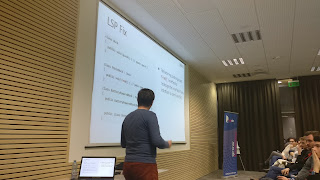On February 13, 2018 we had the first ITCamp Community Winter Event in Cluj-Napoca. At this event we talked about containers and microservices, SOLID principles and blockchain (Coco Framework).
Around 80 people joined the event and stayed with us until the end. There was a lot of interests from people that join the event about what future is preparing for us from blockchain and microservices perspective. Subjects like SOLID are like fairy tales, all the time captivating and interesting.
You can find below slides and pictures from the event.
See you next time!
Container solutions in Azure (Florin Loghiade)
Abstract
Container solutions in Azure: You've probably heard of containers by now, and I'm pretty sure that you've already used one or two in some development scenarios or even production. As to why use containers it is pretty simple to answer. Instead of virtualizing the whole hardware stack as in the case of a virtual machine, you just virtualize the operating system which will run atop of the OS kernel. Translation: They are smaller and faster! That being said, containers need to run somewhere, and in this session, we will be talking about what container solutions are in the Azure Cloud and how we can use them.
Slides
https://www.dropbox.com/s/j5cl5uv4yk0pn61/Container Solutions in Azure - Cluj%2C Feb 13 2018%2C Florin Loghiade.pdf?dl=0
SOLID for Everyone (Daniel Costea)
Abstract
Presentation will show what are and how you can use these principles in a practical way, using C# language, following a series of refactoring steps on an unoptimized sample of code.
Slides
Azure Blockchain Service - myth or reality (Radu Vunvulea)
Abstract
This is a session dedicated to blockchain. We will talk about mining inside a cloud provider and why blockchain is so attractive to any company nowadays. In the second part of the session we will talk about a new service from Azure that is allowing us to use blockchain as a service (SaaS)
Slides
Pictures
Around 80 people joined the event and stayed with us until the end. There was a lot of interests from people that join the event about what future is preparing for us from blockchain and microservices perspective. Subjects like SOLID are like fairy tales, all the time captivating and interesting.
You can find below slides and pictures from the event.
See you next time!
Container solutions in Azure (Florin Loghiade)
Abstract
Container solutions in Azure: You've probably heard of containers by now, and I'm pretty sure that you've already used one or two in some development scenarios or even production. As to why use containers it is pretty simple to answer. Instead of virtualizing the whole hardware stack as in the case of a virtual machine, you just virtualize the operating system which will run atop of the OS kernel. Translation: They are smaller and faster! That being said, containers need to run somewhere, and in this session, we will be talking about what container solutions are in the Azure Cloud and how we can use them.
Slides
https://www.dropbox.com/s/j5cl5uv4yk0pn61/Container Solutions in Azure - Cluj%2C Feb 13 2018%2C Florin Loghiade.pdf?dl=0
SOLID for Everyone (Daniel Costea)
Abstract
Presentation will show what are and how you can use these principles in a practical way, using C# language, following a series of refactoring steps on an unoptimized sample of code.
Slides
Azure Blockchain Service - myth or reality (Radu Vunvulea)
Abstract
This is a session dedicated to blockchain. We will talk about mining inside a cloud provider and why blockchain is so attractive to any company nowadays. In the second part of the session we will talk about a new service from Azure that is allowing us to use blockchain as a service (SaaS)
Slides
Azure Blockchain Service - myth or reality | Radu Vunvulea | ITCamp | Cluj-Napoca | Romania from Radu Vunvulea
Pictures









Comments
Post a Comment